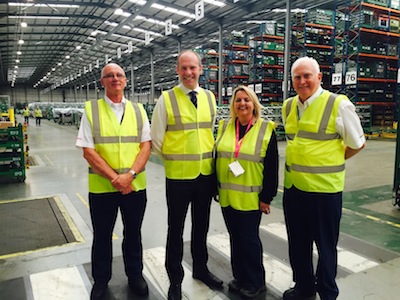
Justin Tomlinson MP has welcomed new figures today showing 224,000 more people in work across the South West since the last Labour Government and a record level of employment across the UK as a whole – with over 2.2 million more people enjoying the security of a job than in 2010.
In North Swindon the number of people claiming out of work benefits has fallen by 1,318 - a 59% per cent drop – since 2010.
The figures also show that average pay is up 2.4% while inflation is close to flat. This means working people across North Swindon are seeing their wages grow and our plan for a higher-employment and higher-wage economy is working.
With employment at a record 73.9%, today’s official statistics show that our economic plan is working – creating jobs and growing pay packets for families in North Swindon as we continue to move towards the goal of full employment that we committed to in our manifesto.
Jobs are being created in North Swindon by companies such as Honda and Honda Logistics, who both recently announced that new jobs would be created as a result of a £200 million investment into the Swindon Honda site.
Justin Tomlinson MP said: "Today’s figures are good news for families in North Swindon this Christmas. With employment at a record high – driven by an increase in full-time work – and wages continuing to grow above inflation, our plan for a higher-employment, higher-wage economy is working. We can see that here in North Swindon with new jobs being created and more money being invested by a range of businesses – from global names to SME’s. The figures also show the number of local people relying on out of work benefits has fallen by 1318 since 2010 – a staggering 59% drop. Even as we end the year on a high, we cannot rest. Nearly 750,000 job vacancies show we have an opportunity to help even more unemployed people back into work. And with the introduction next year of the National Living Wage and 30 hours free childcare for working families, We will continue to work towards a higher-wage, lower-welfare society with opportunity and security at its heart."
Key statistics
- Employment: 3 million (up 505,000 over the past year and up by over 2.2 million since 2010).
- Employment rate: 79.3% (up 1% over the past year and up 3.7% since 2010).
- Unemployment: 1.71 million (down 244,000 over the past year and down 796,000 since 2010).
- Unemployment rate: 5.2% (down 0.8% over the past year and down 2.8% since 2010).
- Claimant count (Jobseeker’s Allowance and Universal Credit not in work): 796,200 in November (down 112,400 on last year and down 698,600 since 2010).
-
Wages: average total pay rose by 2.4% over the last year. Inflation over the same period was close to flat.
Other useful statistics:
- The employment rate is at the highest in our history – at 73.9% of people aged 16-64.
- Unemployment has fallen to a seven year low – at 5.2%
- Private sector employment is up by 2.7 million since 2010.
- There are more women in work than ever before with 975,000 more women in work since 2010, and the number of unemployed women down by 91,000 over the year.
- The proportion of under-25s who are unemployed and not full-time students is the lowest on record – at 5.8 per cent
- Among older people (50-64), employment is up 91,000 on the quarter and 272,000 on the year to 8.35 million.
- The number of long-term unemployed people has fallen by 25 per cent in the last year to 509,000 – the lowest level in six years.
- Vacancies were at 747,000 in the three months to November, up 45,000 on the year and 285,000 since 2010.
It was Labour that left people with fewer jobs and fewer opportunities:
- The number of unemployed people increased by 1 million in Labour’s last term in office.
- The number of people on unemployment benefit rose by 82% in Labour’s last term.
- Youth unemployment rose by 45% under Labour – meaning young people were not getting the skills they need to get on in life.
- The number of households where no member had ever worked nearly doubled under Labour.

